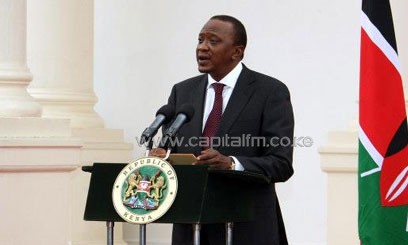
In an interview with the BBC, President Kenyatta says his administration will not go against any of the requirements outlined in The Rome Statute, to which Kenya is a party/FILE
In an interview with the BBC, President Kenyatta says his administration will not go against any of the requirements outlined in The Rome Statute, to which Kenya is a party.
“Kenya is a signatory to the Rome Statute and it is my responsibility to ensure that Kenya meets her obligations and I will ensure that it happens,” he said.
“I also have a personal commitment because it is my name and that of my family that is on the carpet and I have every single intention of ensuring that I clear my family name not just for myself but for the future generations that will bear my name.”
President Kenyatta, who faces charges of crimes against humanity over Kenya’s 2007/8 post-election violence at the ICC, told the broadcaster that he will cooperate with the court until the judicial process ends.
The sentiments by the president come days after ICC Prosecutor Fatou Bensouda disputed the Kenyan government’s claim that it was cooperating with the court.
Bensouda told the Hague-based court that she has encountered difficulties in securing full and timely cooperation from Kenya, despite assurances by government.
She says that although the Government of Kenya (GoK) had allowed investigative missions from the Office of The Prosecutor (OTP) to Kenya, there were other areas in which the government had failed to cooperate.
“Contrary to the GoK’s claims to have acted in “full compliance” with its obligations under the Statute 24, the OTP continues to encounter considerable difficulties in securing full, effective and meaningful cooperation, which continues to deprive the chamber of evidence that may assist in adjudicating the Kenya cases,” she protested.
On May 3, Kenya’s Permanent Representative to the United Nations Macharia Kamau asked the president of the Security Council to press Bensouda to end the proceedings as they were a threat to Kenya’s national security.
Describing the ICC proceedings as partial and a ‘manipulation from different actors,’ Kamau further complained that they were tarnishing the image of Kenya more so that of the president and his deputy.
In the request to have the two cases against Kenyatta, his deputy William Ruto and journalist Joshua arap Sang halted, he explained that the court’s conduct in the Kenyan situation had raised eyebrows in the manner in which investigations were carried out, citing the withdrawal of evidence and prosecution witnesses.
“The proceedings are misplaced. The original claims might have been false and/or manufactured. There is nothing on record to justify the continuation of the cases in Kenya. Obviously, the prosecution advocated its duty of the Rome Statute by failing to undertake investigations and brought before the court testimonies made by coached witnesses,” Kamau asserted.









































